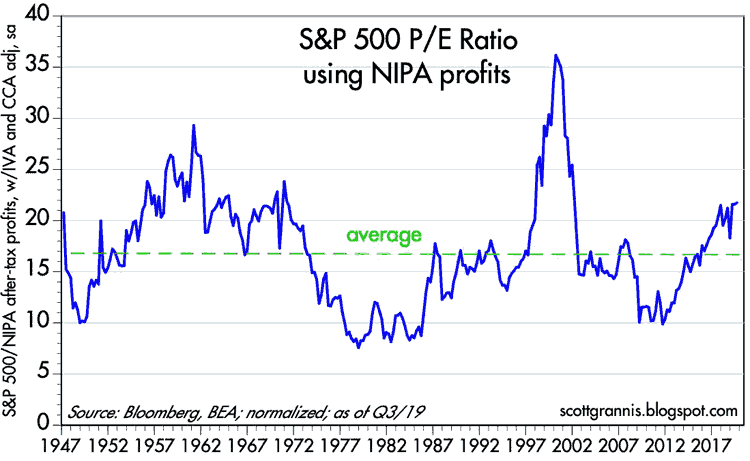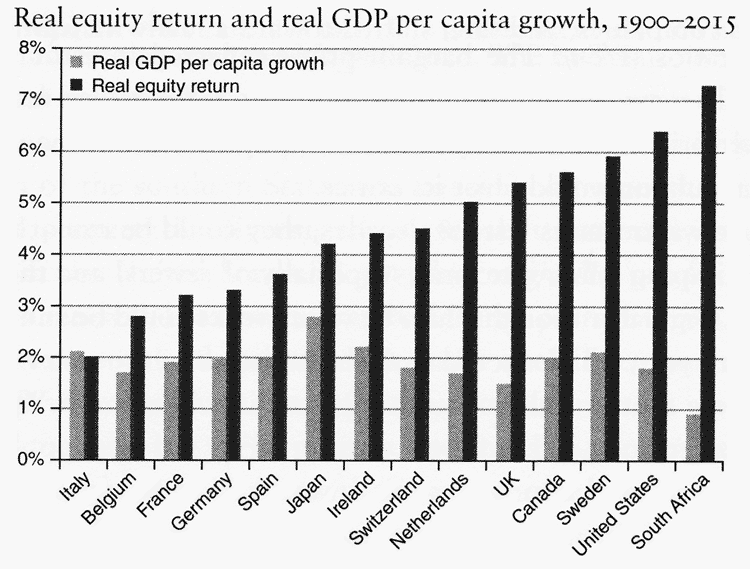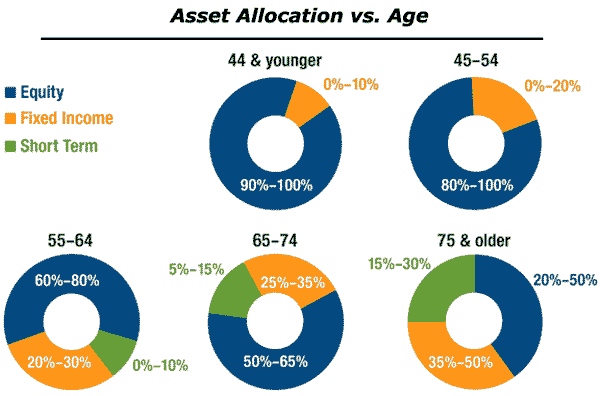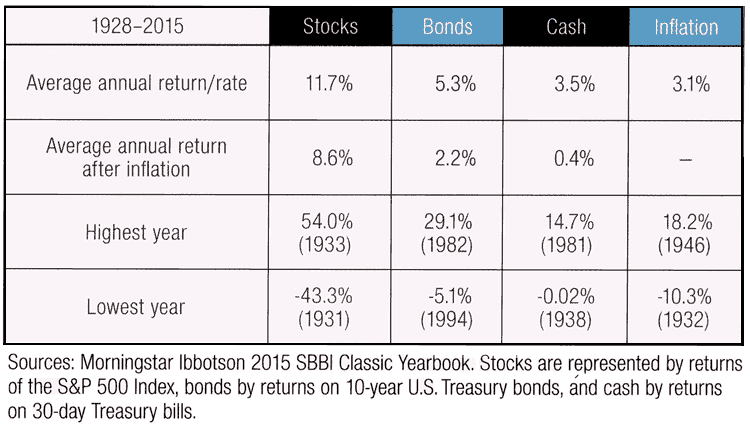Cryptocurrency Made Simple: An explanation everyone can understand:
How Much Will The Stock Market Tank Due To The 2020 Coronavirus? A couple of months ago, Scott Grannis wrote, "According to Bloomberg, the current PE ratio of the S&P 500 (which is calculated using profits from ongoing operations) is a bit over 22. For the past 60 years it has averaged about 17."
The chart shown below "is based on a different calculation of corporate profits, since it uses corporate profits economy-wide, which is drawn from the National Income and Products Accounts. Nevertheless, it gives about the same answer: PE ratios are above-average, but still well below levels that later proved to be excessive valuations (e.g., 1961-62 and 2000). In other words, relative to the prevailing level of Treasury yields, current PE ratios look fairly attractive from a historical perspective."

Fast forward to now - The Coronavirus Crisis. If the market fell to its long term price/earnings ratio average, the Dow-Jones Industrial Average would be around 22,000. But, during really bad times (such as the Great Recession of 2008-2011), the P/E ratio has fallen to 10. That equates to a Dow-Jones Industrial Average of 13,200 or so. Or worse, if earnings fall significantly.
On the other hand, if the virus crisis is over in a few months, the economy will slowly return to business as usual and the stock market will rebound. Economic experts are talking about a rapid V-shaped stock market chart (rapid decent, rapid rise). I'm not sure that the recovery will be as fast as they think, given that the economy was almost forced to a screeching halt for a couple of months. But we can hope that American optimism will prevail.
It is important to remember that stock losses are only paper losses unless you panic and sell. Don't sell. It's not the end of the world. (posted 3/30/20, permalink)
The Decline Of Vanguard: John C. Bogle founded The Vanguard Group in 1975, promising a family of low-cost mutual funds for everyman. He established the first index fund, now the Vanguard 500 Index. Mr. Bogle retired and left Vanguard in 1999. Since then, Vanguard has been run by a series of chief executives - each one moving the family of mutual funds away from Bogle's original vision.
Over the past few years, customer service has gone downhill. Vanguard is now chasing corporate 401k business, cozying up with independent financial planners, pushing their own in-house, fee-based planning service while minimizing services offered to individual accountholders. In 2019, Vanguard axed much of the content from their annual and semi-annual fund reports, including the Advisor's Report section, in which the fund's manager analyzes the successes and shortcomings of the period and reiterates the objective of the particular fund. Sometimes they offered a forecast of the near future. I always read these Advisor's Report to gain insight into my investment as well as the fund managers’ thinking.
 In May 2019, I received an unsolicited e-mail from Janet B., a Vanguard Flagship representative. She wrote, "Thank you for being a Vanguard client for over 29 years. We periodically like to touch base with our Flagship clients to ensure all of their investment needs are being met. I'm reaching out now because I plan to call you over the next few days to discuss a few account related items." When I didn't hear from her for three weeks, I wrote back and asked why she hadn't called. After another week, she called but didn't have much to discuss. (I never did find out what "few account related items" she wanted to discuss. ... so much for prompt service.) In May 2019, I received an unsolicited e-mail from Janet B., a Vanguard Flagship representative. She wrote, "Thank you for being a Vanguard client for over 29 years. We periodically like to touch base with our Flagship clients to ensure all of their investment needs are being met. I'm reaching out now because I plan to call you over the next few days to discuss a few account related items." When I didn't hear from her for three weeks, I wrote back and asked why she hadn't called. After another week, she called but didn't have much to discuss. (I never did find out what "few account related items" she wanted to discuss. ... so much for prompt service.)
I pointed out that, in recent years, my wife and I have noticed a decline in customer service from her firm, specifically mentioning the jettisoning of the Advisor's Report. Janet didn't know anything about the absence of Advisor's Reports and said that it was "hard for customer service to keep up because the client base was growing so fast."
Thanks for nothing. One wonders why she bothered to contact me in the first place.
At the end of July, I wrote to Mortimer J. Buckley, Chairman of The Vanguard Group, expressing my concerns about the company's customer service. I never heard from him … instead, he bounced my letter back to - guess who? - Janet B., who was as unhelpful as ever. She claimed that Vanguard surveyed investors and "found that almost no one reads the Advisor's Report, so it was deleted." I found this difficult to believe.
I'm not alone in my complaints. In The Vanguard Advisor Forum, several people complained. One member wrote, "I have been a Flagship client for about 20 years. During that time I have always been assigned a specific representative. Some of these reps were very helpful. They knew my investments and therefore could respond appropriately when problems developed. Recently I sent a secure e-mail to my current rep who has been with me for several years. In response I was told that Vanguard no longer assigns a specific rep to Flagship clients. Vanguard's explanation was as follows:
'We're making this change for several reasons:
• To connect you with the right expert at the right time, with more specialized client service teams.
• To expedite service, with an intuitive phone system.
• To better serve you as your needs evolve, with direct access to a full team of skilled professionals.'
It seems to me that the true purpose is to reduce expenses and I object to what Vanguard has done.“
Another wrote, "I retired (from Vanguard) 12 years ago when the major accepted business model became: Do more with less, faster, smile and don't spend any/much money!"
Recently, there have been difficulties logging on to the secure Vanguard website … incorrect information on client holdings. Dan Wiener wrote, "Vanguard reported huge declines for many funds - one of two big data errors Vanguard has suffered of late. It turns out that, yes, you do still have to question the data when your Internet feed tells you that your balanced fund has dropped 25% in a day. On Monday, Vanguard's website was showing funds like Target Retirement Income (VTINX) dropping 45.61% for the day and STAR (VGSTX) down 25.01%. Imagine the heart attacks when Wellington (VWELX) investors saw their fund had dropped 31.92% in one day Well, as you might imagine, it was a data glitch, which Vanguard blamed on external data feeds."
Wiener added, "Recently, a young Vanguard Flagship representative was forced to do a major edit on her profile after she was found to have written that she was, and now I'm quoting, "managing my own book of business, made up of over $2 billion in assets and 253 high net worth families." Wow! Her own $2 billion book of business. Well, Vanguard must have gotten wind of this because, this week, she did a major rewrite and now simply says she works for Vanguard in the Flagship area." I wonder if it was Janet B.?
Jack Bogle died in early 2019 at age 89. Given the recent changes at Vanguard, he's probably spinning in his grave. We have stopped recommending Vanguard to friends and relatives and have begun moving some of our own money to other fund families. (posted 9/6/19, permalink)
In Praise Of Index Mutual Funds: In late March 2019, Dan Weiner's Independent Adviser for Vanguard Investors, a paid financial advisory service, wrote, "Our Model Portfolios are showing good returns for the year … the Growth Model is up 11.4%."
I'm not impressed. For the same period, Admiral shares of the Vanguard Index 500 Fund gained 12.88%. (For the first quarter of 2019 which ended a few days after Weiner's comment, the S&P was up 13.07%.)
The Vanguard Index 500 was John Bogle's first index fund; it tracks the S&P 500 stock average. Its superior performance makes me wonder whether a subscription to Weiner's newsletter is justified. Besides, when you subscribe to Weiner's newsletter, you are deluged with spam e-mails from Investor Place - three to six every day. And using the Unsuscribe option seems to only increase the amount of spam received from these cretins.
Dan Weiner used to interview Vanguard managers and disclosed a lot of insider information in his monthly newsletter. Lately, he's been coasting and his monthly newsletter has become boring and far less useful than it used to be.
I won't be renewing my paid subscription to Weiner's newsletter. (posted 4/4/19, permalink)
Bad Stock Market Predictions: Dan Wiener of the Independent Adviser for Vanguard Investors wrote in his January 2018 newsletter, "This year, I'm giving the Roubini Award to the folks at thesovereigninvestor.com for their wrong-headed ads that littered the web with headlines like 'Dow to Drop 80% in 2016'. Not only was that particular headline ridiculous, it was also about a year too late. The last one I saw was running on January 3, 2017, and - wait for it - just days later the same group was running an ad claiming the Dow would hit 50,000, though the exact timing of this milestone was left unreported. The URL for The Sovereign Investor now redirects to something called Banyan Hill, which I assume is like a public version of the witness protection program for great marketers and lousy market prognosticators.
Congratulations to The Sovereign Investor or Banyan Hill or whomever you are this week. You win the Roubini Award for 2018. I can't wait to see what kinds of predictions you come up with this year."
Dan added, "The beginning of 2017 featured lots of gloom and doomers, many of whom either claim to have or actually do have Harvard degrees and let you know it in bold print. Calling himself a "famed Harvard economist," Harry Dent predicted 'The Greatest Stock Market Collapse since the Great Depression'. Again, the timing wasn't clear, but the headline was. So far, no collapse."
Harry Dent is always wrong. In 1998, he said that the Dow would rise to 35,000 by 2008. The evolution of Mr. Dent's book titles tells quite a story:
• 'The Great Boom Ahead' - published in 1993
• 'The Roaring 2000s' - published in 1998
• 'The Next Great Bubble Boom' - published in 2006
• 'The Great Depression Ahead' - published in 2009
In August 2014, Dent told Stuart Varney on Fox Business that the Dow Jones Industrial Average will soon fall to 6,000 - a drop of over 63%. Never happened.
Be skeptical of all predictions, even by 'experts'. (posted 1/10/18, permalink)
Staying Close To Home: In late 2017, I read a very informative book, 'Big Money Thinks Small: Biases, Blind Spots, and Smarter Investing' by Joel Tillinghast. My full review is posted here.
Mr. Tillinghast has kindly provided a reassuring bar graph, showing that, for the most part, U.S. stocks have provided the best returns for the past 115 years:

Over the past couple of years, I've had various advisers and mutual fund reps suggest that I should have more "exposure to international funds." Actually, anytime you invest in large cap mutual funds, such as the Vanguard Index 500 Fund, you're always buying shares of companies with multinational exposure (IBM, Apple, 3M, Caterpillar, Dow, Merck & Co., etc.). Over the past five years, Vanguard's Index 500 Fund has returned 14%/year compared with a tepid 6%/yr. for the firm's International Growth Fund. (posted 11/24/17, permalink)
Asset Allocation: T. Rowe Price, a mutual fund company, recently stated, "It is important to have an appropriate mix of the different investment categories: equities, fixed income, and short-term investments. The length of time a retirement investor plans to invest his or her savings can help determine how much money to allocate to each type of investment."
As an investor gets closer to retirement, his or her portfolio may move gradually from more aggressive (more equity) to more conservative (less equity). Consider the T. Rowe Price age-based asset allocation models below:

T. Rowe Price is not alone - such age-allocation ideas are shared by many investment advisers.
As regular readers already know, I'm not a subscriber to the Lotsa Bonds For Geezers school of thought but I am of the opinion that as one ages, one should move one's portfolio away from high-risk, volatile stocks into more conservative equity investments. With a few bonds and some cash (savings accounts, money market funds, etc.) thrown in for good measure.
Malcolm Berko has written, "A portfolio of 60% stocks and 40% bonds when you retire ... is by the book and industrial-strength stupid. If you were retired today and 40% of your portfolio were in bonds, you'd be collecting food stamps, using Medicaid, applying for housing assistance and shopping at Dollar Tree, The Salvation Army and flea markets." (posted 10/12/17, permalink)
Being Prudent In An Imprudent World: I've heard and read advice from so-called investment advisors, stating that the stock market has grown an average of 8% per year over the last 80 years, so it's OK to take 8% every year from your retirement savings. A few years ago, television ads from Fidelity Investments touted that it's perfectly reasonable to withdraw 4-5% from your retirement account and not worry. Baloney.
An article several years ago in The Motley Fool stated that the "use of a 4% withdrawal rate had a reasonable probability of success only in the 100% S&P 500 and the 75% S&P 500/25% Bond portfolios. None of the portfolios had a good probability of success using a withdrawal rate of 6% or higher save for the shorter payout periods. The 100% bond portfolio failed miserably in comparison with all other portfolios." Other studies have indicated that the withdrawal rate should be limited to 3% or so if you want complete safety.
My advice: Have an investment stew of mostly stocks (or stock mutual funds) and a sprinkle of bonds (or bond funds). A 3% to 4% withdrawal rate is the magic number - historically, it's the best assurance that you'll never outlive your money. Even if there's a period of doom ahead:

Prudence pays. (posted 1/27/17, permalink)
Trump Rally: Ever since Donald Trump won the presidential election, the stock market has soared. As I write this (in mid-December 2016), the Dow is air-kissing 20,000, while the S&P - with dividends reinvested - is up almost 13% in 2016. Even the staid, 87 year-old Wellington Fund is up over 11% this year. Furthermore, the Consumer Sentiment Index rose from 93.8 to 98 in the last month. The surge was largely due to consumers’ initial reactions to Trump's surprise victory.
It's fun to point out that, on November 9, 2016 - the day after the election, Paul Krugman - the diminutive doomsayer and Nobel Prize-winning economist from the New York Times - predicted that the stock market would never recover from Donald Trump's victory. "We are very probably looking at a global recession, with no end in sight. I suppose we could get lucky somehow. But on economics, as on everything else, a terrible thing has just happened." Ha!

The stock market is always looking to the future. It is also a reflection of the mood of investors. At this point, it's getting a little ahead of itself in terms of Price Earnings Ratios but that's because it "sees" increases in corporate earnings during a Trump presidency; investors are impressed with his initial moves (Carrier, the $50 billion SoftBank investment, cabinet picks, etc.) so far - even though The Donald hasn't yet been inaugurated.
Many years ago, as a high school freshman, I was in the school library reading a news article about the soon-to-be-introduced 1958 automobiles. A couple of very snooty classmates walked by and, seeing me studying Wall Street Journal, quipped, "Looking for stock tips, Joe?" I replied, "I think the stock market is interesting because it's an indicator of what people are thinking." One turned to the other and said, "What an idiot!" as they walked away. It turned out that, despite my investment naiveté, I was right.
Under the burdensome yoke of Obama Administration with its continuous attempts to destroy the nation's businesses, the mighty engine of the American economy could not roar. And people weren't thinking happy thoughts about America's direction. In the almost 10-year period since the Great Recession began, the Dow has grown less than 3%/year. This is exceptionally poor performance; Bush and Obama share the blame.
When Obama's gone and Trump's in charge, the economy can roar as loudly as it wants. Most people believe that will happen, which is why we are now experiencing a soaring stock market. Call it The Trump Effect.
The last transformative and business-friendly U.S. president was Ronald Reagan. From the time of his election until his last day in office, the Dow Jones Industrial Average rose almost 147%. If the same market performance happened under eight years of Trump, the Dow would exceed 44,000 by 2024.
I'm bulllish on investing in America. Go Trump! (posted 12/12/16, permalink)
Health Care Investing: In September 2016, financial columnist Malcolm Berko recommended investing in the T. Rowe Price Health Sciences Fund, a no-load mutual fund "which buys companies engaged in research, development, production and distribution of products and services related to the health care industry.
Because consumers have no say in their medical care costs and because Congress pays the bills, the medical industry will always be one of the fastest-growing and most profitable industries in the U.S."
Health Sciences Fund "owns Thermo Fisher Scientific, Gilead Sciences, Cigna and other companies with names that are unpronounceable. It's down 8.3% in the past 12 months; however, its three-, five- and 10-year total returns are 20.1%, 20.6% and 15.8%, respectively. And the total return since its inception 21 years ago is 14.5%. Those are mighty impressive numbers, even by Warren Buffett standards."
I added Health Sciences to my portfolio last year. (posted 9/26/16, permalink)
For The Long Haul ... stick with stocks as an investment.

A table, comparing the 87-year performance of U.S. stocks with bonds and T-bills, shows that stocks are the best investment - by far - for the long term. After inflation, stocks returned 8.6% per year to investors over a nearly century-long span. (posted 7/21/16, permalink)
Humongous Revenues, Puny Profits: In May 2016, Malcolm Berko wrote about online megagiant Amazon: "Amazon has 231,000 employees, revenues of $107 billion, net income of $600 million and a market cap of $275 billion. Amazon generated $110 billion in revenue and with net profit margins of 0.6%, earned a niggardly $600 million."
Amazon trades at $700 per share - an absurdly-high 550 times earnings. "Jeff Bezos, who seems to have lost his hair, needs a lot of magic, and soon, because nothing in this world is worth 550 times earnings. And some Amazon doubters think the purchase of a 6-month put option might be a profitable trade."
Mr. Berko didn't like Amazon when it was trading at $350 in 2014 nor in 2015 when it was trading at $500 last year. Berko wrote, "I don't like AMZN today at $700 and may not like AMZN later this year at $800." The problem is that Amazon has a long history of not caring about profits.
At those legendary discount stores of the 1950s and '60s, (E.J. Corvette, Two Guys, S. Klein, etc.), margins and profits were always low. And you know what happened to those guys ... eventually.
My advice remains the same as Malcolm's: Buy 'stuff' from Amazon if you want but don't buy the stock. (posted 5/31/16, permalink)
 The Old Rules No Longer Apply: Financial columnist Malcolm Berko recently wrote, "A portfolio of 60% stocks and 40% bonds when you retire ... is by the book and industrial-strength stupid. If you were retired today and 40% of your portfolio were in bonds, you'd be collecting food stamps, using Medicaid, applying for housing assistance and shopping at Dollar Tree, The Salvation Army and flea markets. The Old Rules No Longer Apply: Financial columnist Malcolm Berko recently wrote, "A portfolio of 60% stocks and 40% bonds when you retire ... is by the book and industrial-strength stupid. If you were retired today and 40% of your portfolio were in bonds, you'd be collecting food stamps, using Medicaid, applying for housing assistance and shopping at Dollar Tree, The Salvation Army and flea markets.
Most good stocks deliver better inflation-adjusted returns than bonds; issues such as Procter & Gamble, AT&T, Johnson & Johnson, Verizon Communications, Exxon Mobil, Southern Co. and Consolidated Edison are only a few of the hundreds of common stocks, exchange-traded funds and mutual funds that have put bonds to shame and will continue to do so.
These issues raise their dividends annually, whereas bonds, which are fixed-income investments, are a very poor hedge against inflation because fixed income never increases."
In this particular column, he was addressing concerns raised by a 54 year-old interior decorator whose broker had recommended that he have a 60/40 stocks-to-bonds mix in his $260,000 retirement portfolio.
I'm not a fan of the idea of shifting your investments into more bonds as you grow older, either. As I've written before, I am dismayed by the rush to invest in these newfangled Target Date Funds, especially as a repository for funds needed for retirement. A target-date fund - sometimes called a life-cycle fund - is a mutual fund which uses a time-variable ratio of stocks to bonds. It's a mindless sort of investment which gradually shifts its holdings towards bonds as an investor's age climbs.
Target-date funds are aimed at retirement plans and have appeal because they "offer a lifelong managed investment strategy so should remain appropriate to an investor's risk profile even if left accidentally unreviewed."
Ummmm ... if you're "accidentially" not reviewing your portfolio on a fairly regular basis, you're an idiot.
Berko concluded, "Please be mindful that you're making a significant error in judgment if you allow this schnook to manage your retirement account by the book. Have a talk with him immediately, or find another broker who is not afraid of his own shadow."
As for me, I'm still almost 90% invested in equities (mostly mutual funds); the balance is in cash and bonds - even though the numbers crunchers at one of my mutual fund companies think that I should have 65% of my money in bonds. No thanks. (posted 7/7/15, permalink)
Then & Now:
• Net assets, all U.S. mutual funds: 1975 - $46 billion, Now - $15 trillion
• Number of U.S. mutual funds offered: 1975 - 426, Now - 7,707
(posted 6/29/15, permalink)
 Everybody's Jumpin' On The Bandwagon: Health care stocks and funds are on a tear these days. Actually, they have been for almost 30 years. Everybody's Jumpin' On The Bandwagon: Health care stocks and funds are on a tear these days. Actually, they have been for almost 30 years.
T. Rowe Price has a hot-performing mutual fund, Health Sciences Fund. The fund just announced that it was closing to new investors on June 1st, noting that "the pace of flows into the fund increased dramatically over the last several years."
TRP President Edward C. Bernard went on to state that the fund is being closed "to ensure that additional strong flows do not overwhelm our ability to invest prudently in the health-related stocks that are the centerpiece of the fund." I'm glad that I got into Health Sciences Fund earlier this year. Existing investors can continue to add to their fund holdings.
Malcolm Berko wrote recently, "Making big bucks in the health care industry is as easy as falling off a piece of cake, because the operating culture at Medicare and Medicaid is perversely polluted.
These programs are managed by political (often crooked) appointees and staffed by low-skilled, overpaid government employees, few of whom have incentive to excel in their jobs. Making huge bucks in the insurance side of this industry is easy, too, because the private, for-profit insurance companies are niggardly in their reimbursements. Anthem, UnitedHealth Group et al. are required to make as much money as possible for their stockholders. And if revenues, incomes and dividends of one of these insurers fail to meet expectations, the CEO may lose his job. This is a Catch-44, which is twice as bad as a Catch-22." (posted 5/6/15, permalink)
Healthy Lesson: Malcolm Berko is a believer in the continued rise of the health care stock segment. So am I.
He related this story: "Several years after Medicare was established in 1965, a young orthopedic surgeon I knew was told by his father, who was a big shot at Merck, to triple his office size, take on two partners and purchase a large home on the water. He told his son that he and his partners would be working 14-hour days and would barely be able to handle the patient flow that would occupy his Tampa, Florida, waiting room. I also remember the father's comment that Congress had become Santa Claus - when it designed a boondoggle of tax dollars for the medical profession - and that most medical specialists such as his son would become multimillionaires after a few years.
That was about 45 years ago. It's true today, and some colleges offer courses in exploiting medical billing codes by teaching office staff how to maximize income from the Medicare/Medicaid coding system. Meanwhile, hospitals, outpatient and physical therapy centers, pharmaceutical companies, medical device companies, and contractors hired by Medicare and Medicaid are swimming in oceans of federal money.
In 2013, the Pentagon spent $720 billion on defense, and in 2014, the Pentagon spent $771 billion on defense. However, health care growth and fraud are on steroids. In 2013, Americans spent $3.3 trillion on health care, and last year, we spent $3.7 trillion. This year, we're expected to spend $4.2 trillion, and by 2020, we may be spending $6.8 trillion."
Berko continues to recommend investments in health care stocks, ETFs and mutual funds. (posted 4/7/15, permalink)
 Financial Planning Help: Jonathan Clements of The Wall Street Journal has speculated that there will soon be great changes to the world of financial advisers. Financial Planning Help: Jonathan Clements of The Wall Street Journal has speculated that there will soon be great changes to the world of financial advisers.
He wrote, "For the past decade, fund investors have eschewed actively managed funds, those that aim to beat the market. Instead, they have poured money into passively managed index funds, which seek to replicate the performance of a market average.
That shift has driven down investment costs. But even as fund expenses have fallen, one cost has held remarkably steady: the price paid for financial advice.
Will we see an end to the standard 1% of assets charged each year by many financial advisers? My hunch: Traditional advisers won't cut their fees - but they'll need to beef up their offerings or risk losing clients to low-cost online advisers."
In my view, there are six sources of investment advice:
• Brokerage Salespeople: These come from the likes of Merrill Lynch, Edward Jones, etc. as well as various Wealth Management Departments of banks and, of course, insurance agencies. They make their much of their money from commissions.
Quality of advice varies greatly; sadly, too many of these guys are short-sighted dolts. Brokerage reps can be costly since almost every investment will be front-loaded and usually fee-heavy.
• Percentage Advisers: These folks generally charge 1% of your assets to tell you where to put your money. Usually, they're only interested in clients whose net worth is $500,000 or more. Everyone else gets the ol' heave-ho. If you're over 55 years old and are in any 'moneyed' database, you probably get mailings from such people inviting you to dinner and "an important financial presentation" at a fairly good restaurant, like Ruth's Chris.
That's how they troll for business. If you've got $1,000,000 invested with these people, their advice is going to cost $10,000 every year on top of whatever sales/management fees you're paying to the mutual funds they recommend. Ken Fisher Investments also falls into this general category.
Of course, you could always do your own research and then buy yourself many dinners at Ruth's Chris with the money you save.
• Fee-only advisers: Such people charge a flat fee for their recommendations. I've used one and was very pleased. He laid out a multi-year plan for us for a flat fee of $600. He was well worth the money.
Before you choose one, ask for references.
• Online Advisers: This is a relatively new concept, where you deal with a financial planner online. Mr. Clements wrote, "Betterment.com, SigFig.com and Wealthfront.com typically charge 0.25% a year, though it can be less, depending on an account's size. Charles Schwab won't charge anything for its new online advisory service, slated to launch during 2015’s first three months. It will provide investors with customized index-fund portfolios."
Fees are lower than traditional advisers but do you want to give all your financial information to an online presence who may turn out be a scammer? I'm sure many of these people are legitimate, but how do you sort them out? Too scary for me.
• Newsletters: Available in print and online forms, they vary greatly in quality. Do some Google searches before you choose one. Most cost $100-200 per year. These guys are basically stock-pickers or mutual fund pickers.
Tax advice and long-term financial planning is typically not offered but, if you're confused by the humongous number of mutual funds out there, these letters can help you narrow the field. For example, Dan Wiener of The Independent Adviser for Vanguard makes recommendations on Vanguard mutual funds in monthly newsletter form for $99/year.
• Free Advice: There's lots of it online. The quality varies all over the place, but The Motley Fool and Morningstar aren't bad places to start.
If you don't have much money to manage, you're going to end up doing your own research anyway. That's what I had to do in my younger years. Suddenly, when my company surpassed the 40 employee-level, financial gurus started soliciting my business. (Apparently, the increased size of my manufacturing business got me on some targeted leads list.) Too bad for most of them, because I had already learned to manage investments on my own and had no need of a big fee, tasseled-loafer-shod adviser to take my money.
I've had conversations at two mutual funds recently; both reps I spoke with on the phone were Certified Financial Planners. This is an interesting new trend, where some mutual funds are getting into the advice business. (Vanguard now offers an advisory service for a fee of 0.30% of assets under management.) Of course, the funds they advise you to invest in will be their own, so there's that. Unfortunately, too many of them will try to usher you and your assets into a Targeted Date Fund. But, if you have enough money invested with them, the advice often comes free.
Clements concluded that new choices make the road rocky for traditional financial planners. "What if traditional advisers continue to offer portfolio building, the occasional in-person meeting and a client dinner once a year? They shouldn't be surprised if clients head elsewhere." (posted 2/16/15, permalink)
 Where To Invest These Days: I'm not a registered investment adviser nor have I ever played one on television. But I've been investing for over 45 years and have, therefore, gained some real-world experience and useful knowledge. Where To Invest These Days: I'm not a registered investment adviser nor have I ever played one on television. But I've been investing for over 45 years and have, therefore, gained some real-world experience and useful knowledge.
I am dismayed by the rush to invest in these newfangled Target Date Funds, especially as a repository for funds needed in one's retirement.
A target-date fund - sometimes called a life-cycle fund - is a mutual fund which uses a time-variable ratio of stocks to bonds. It's a mindless sort of investment which gradually shifts its holdings towards bonds as an investor's age climbs.
Target-date funds are aimed at retirement plans and have appeal because they "offer a lifelong managed investment strategy so should remain appropriate to an investor's risk profile even if left accidentally unreviewed."
Ummmm ... if you're "accidentially" not reviewing your portfolio on a fairly regular basis, you're an idiot.
There is an old saw that you take your age and subtract it from 100. The remainder is the percentage of stocks which should be in your investment portfolio. So if you're 65, you should have 35% in stocks and the rest in bonds.
Such a simplistic formula may have been relevant a half-century ago but the bond markets of recent years are not always the safe harbor they used to be. Bond-heavy portfolios seem to be a bad bet these days. Consider the annual returns (as of 12/31/14) on these Vanguard mutual funds over various time periods, including the Great Crash of 2008:
| Investment |
Allocation |
1 Year
|
3 Year
|
5 Year
|
10 Year
|
2008 return
|
| Index 500 Fund |
100% stocks |
13.6%
|
20.4%
|
15.4%
|
7.7%
|
-37.0%
|
| Wellington Fund |
66% stocks; 34% bonds |
9.9%
|
14.0%
|
11.4%
|
8.1%
|
-22.2%
|
| Wellesley Fund |
40% stocks; 60% bonds |
8.1%
|
9.1%
|
9.5%
|
7.2%
|
-9.8%
|
| Total Mkt. Bond Index Fund |
100% bonds |
5.8%
|
2.5%
|
4.2%
|
4.6%
|
5.1%
|
| Capital Opportunity Fund |
100% high-growth stocks |
19.0%
|
26.2%
|
16.0%
|
10.3%
|
-39.0%
|
| Health Care Fund |
100% health care stocks |
28.6%
|
28.5%
|
20.2%
|
12.8%
|
-18.4%
|
| Dividend Growth Fund |
100% dividend-paying stocks |
11.9%
|
17.5%
|
14.6%
|
9.1%
|
-25.6%
|
I'm not a subscriber to the Lotsa Bonds For Geezers school of thought but I am of the opinion that as one ages, one should move one's portfolio away from high-risk, volatile stocks into more conservative equity investments. With a few bonds thrown in for good measure.
It seems that I'm in the minority these days. According to a 2013 Morningstar article, target-date funds have won the day. "Almost unanimously, plan sponsors are selecting target-date funds as the repository for automatically enrolled monies (at Vanguard, the figure is 90%). With those assets growing, and target dates remaining popular with investors who make active investment choices, target-date funds are becoming very popular indeed."
"Half of Vanguard's participants use target-date funds in some fashion. Many own either multiple target-date funds or a target-date fund plus other types of funds, which isn't how target dates were designed to be used but is mostly harmless. (Having several target-date funds makes for a blurry picture, but the performance tends to be pretty much like that of the middle fund in the series.) The other half, or 27% in total, own nothing but a single target-date fund. In 2007, that figure was 13%."
Not me. I'll set my own targets. I'm still almost 90% invested in equities (mostly mutual funds); the balance is in cash and bonds - even though the numbers crunchers at one of my mutual fund companies think that I should have 65% of my money in bonds. No thanks. (posted 1/13/15, permalink)
 Bad Investments: In a year when the S&P 500 is up almost 14%, the Nysa Fund is the worst performing mutual fund of 2014, down 41% so far this year. "The fund received just one out of five stars from Morningstar, the worst rating for past performance awarded." Jeez, don't they have a Zero Star rating? Bad Investments: In a year when the S&P 500 is up almost 14%, the Nysa Fund is the worst performing mutual fund of 2014, down 41% so far this year. "The fund received just one out of five stars from Morningstar, the worst rating for past performance awarded." Jeez, don't they have a Zero Star rating?
As for individual stocks, one of the year's big losers is Amedica, a manufacturer of silicon nitride orthopedic and spinal implants. Shares have fallen by more than 90%. "With a book value of just under $12 million and nearly $5 million in losses in the last quarter, Amedica is quite small and quite risky." By comparison, many health care mutual funds are up about 30% so far in 2014.
Regarding fiat money, this was not a good year to bet against the dollar which has risen in value compared with other currencies. "No currency has slumped more against the dollar than the Russian ruble, which has dropped 39% this year vis-a-vis the dollar. While selling rubles and buying dollars would have produced the largest gain in 2014, buying the ruble and selling the dollar would have produced the largest loss.
The declining ruble has be painful for many Russians. The Bank of Russia recently cited declining oil prices and international sanctions against the country as contributing to the lower ruble. In an effort to control high inflation resulting from the currency weakness, the central bank raised interest rates."
If you've not invested in the Nysa Fund, Amedica or rubles, give yourself a pat on the back. (posted 12/12/14, permalink)
 No Ally Of Mine: Tempted by its relatively high-money market rates (which are still very low but five times better than the best rates locally - these days most local banks offer about the same compound interest as a sperm bank), I tried to do business with Ally Bank. I filled in all the paperwork and mailed a check, since I do not do banking or investment transactions online. No Ally Of Mine: Tempted by its relatively high-money market rates (which are still very low but five times better than the best rates locally - these days most local banks offer about the same compound interest as a sperm bank), I tried to do business with Ally Bank. I filled in all the paperwork and mailed a check, since I do not do banking or investment transactions online.
The check was mailed August 15th. Then the 'fun' began. First, Ally claimed that I failed to send page two of my application. Not true, Ally lost it. They sent another one. I filled out the second page and mailed it.
Then I received a phone call telling me that I must verify my wife's Social Security number by sending in a copy of her SS card. In my fifty-plus years of banking, I've never received such a request. Frustrated, I told them to tear up my application and return my check. They failed to return the check and it took multiple calls to get them to do so.
My advice: don't do business with Ally Bank, formerly GMAC. Its personnel are unempowered, clueless and incompetent. (posted 10/6/14, permalink)
 I Am Becoming My Grandmother. The Wellington Fund turned 84 years old in July 2013. Now the nation's oldest and largest balanced mutual fund, its inception was just before the 1929 stock market crash and the Great Depression that followed. Talk about bad timing. I Am Becoming My Grandmother. The Wellington Fund turned 84 years old in July 2013. Now the nation's oldest and largest balanced mutual fund, its inception was just before the 1929 stock market crash and the Great Depression that followed. Talk about bad timing.
A young Philadelphia accountant named Walter L. Morgan was its founder and offered a diverse portfolio of common stocks, preferred stocks and high-quality corporate and U.S. government bonds. Despite a rocky (How about 'cliff-like'?) investment climate during the fund's formative years, Morgan's conservatism and balanced approach paid off. Wellington Fund has produced an 8.2+% average annual return since its 1929 inception and has paid an uninterrupted string of 336 quarterly dividends.
Over the past ten years, its overall performance has been significantly better than the S&P 500. Yet it is far less risky and does not drop precipitously during stock market contractions.
Wellington isn't very flashy and gets little notice from those investment gurus du jour. As I got older, I began to shift some of my investments away from growth mutual funds into Wellington. I have not been disappointed.
But I feel like a geezer ... my grandmother owned Wellington Fund shares in the 1950s. During her 90-year life, she never ran out of money. (posted 9/26/13, permalink)
 Paging Mr. Ponzi: Referring to that forced retirement 'investment' that gets deducted from every worker's paycheck, Malcolm Berko wrote, "Stop referring to Social Security as an "entitlement." SS is not an entitlement. Every time you or your spouse earned a paycheck, the employer sent Social Security 6.2% of it to an account under your or her name. Paging Mr. Ponzi: Referring to that forced retirement 'investment' that gets deducted from every worker's paycheck, Malcolm Berko wrote, "Stop referring to Social Security as an "entitlement." SS is not an entitlement. Every time you or your spouse earned a paycheck, the employer sent Social Security 6.2% of it to an account under your or her name.
And each time you or your spouse earned a paycheck, the employer also sent SS a matching amount to your account. That's 12.4% per paycheck, and your spouse never received a shilling of it. You earned it! You paid for it! It's your money! It's not an entitlement!
The word "entitlements" is government-speak for the federal programs from which lots of folks receive support that they don't pay for. However, Congress is ill-advised to call Social Security an entitlement. Calling SS an entitlement is purposefully disparaging and places it on the same common field as food stamps, job training, free cellphones, etc."
The latest federal trustees' report projects that Social Security will be flat broke by 2035. The Social Security program faces $9.6 trillion in unfunded liabilities over the next 75 years, which is up $1 trillion from last year's projection of $8.6 trillion.
The picture shown here is from a Social Security information brochure I was given when I began working in 1958. The hapless character is named J. Wilbur Worker. Looking at the graphic, I wondered if it influenced Matthew Lesko's sartorial choices? The entire pamphlet, originally created in 1953 is shown here. (My copy is a 1956 revision.)
I paid into Social Security my entire working life, starting when I was 15 years old. Social Security is a promised annuity, which is greatly underfunded. All of the money paid in by a younger generation is immediately paid out as obligations to an older generation.
In the private sector, this is known as a Ponzi scheme. (posted 6/4/13, permalink)
Other Pages Of Interest
| blog: 'The View Through The Windshield' |
| greatest hits: index of essays & articles | blog archives | '39 Plymouth |
| model train layout | about me | about the blog | e-mail |
copyright 2013-20 - Joseph M. Sherlock - All applicable rights reserved
Disclaimer
The facts presented on this website are based on my best guesses and my substantially faulty geezer memory. The opinions expressed herein are strictly those of the author and are protected by the U.S. Constitution. Probably.
If I have slandered any brands of automobiles on this car-oriented site, either expressly or inadvertently, they're most likely crap cars and deserve it. Automobile manufacturers should be aware that they always have the option of trying to change my mind by providing me with vehicles to test drive. I'll dutifully report my road test impressions on this car blog.
If I have slandered any people or corporations on this page, either expressly or inadvertently, they should buy me strong drinks (and an expensive meal) and try to prove to me that they're not the jerks I've portrayed them to be. If you're buying, I'm willing to listen.
| |